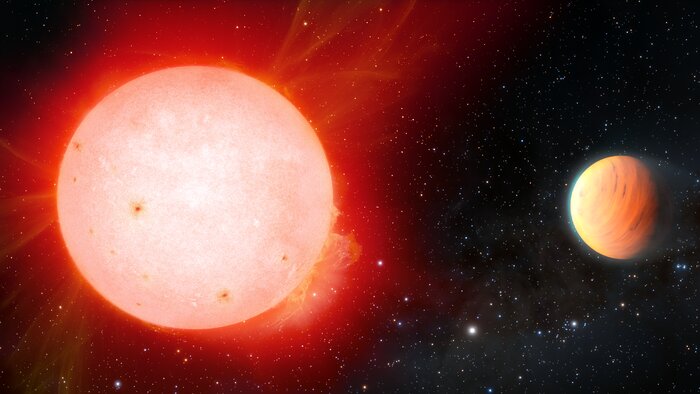
How fun it would be to fit different kinds of planets and stars out there in the universe into one room, or discover a planet that had a music player of its own with continuous music playing in the background or even a planet with only trees! It’s almost like a sci-fi movie or book with a different version of the Solar System.
But not all of it is fiction anymore. Scientists have recently discovered a ‘marshmallow planet’ named TOI-3757 b, which is reportedly a planet with a really low density – so much so that astronomers think it could float in a tub of water.
Using a telescope in Arizona, United States, scientists discovered the gas giant in the constellation of Auriga, about 580 light-years away. The planet happens to be the size of Jupiter and orbits a red dwarf star. Dwarf stars are common in the Milky Way, making up about 70% of the stars and are less hot than the Sun.

A red dwarf star. Source: NASA
TOI-3757 b is the fluffiest gas giant we know of so far, with a density of about 7 grams per cubic feet (0.27 grams per cubic centimetre). It means it has half the density of Saturn, a quarter of Jupiter, and equal to the density of a marshmallow.
Scientists are surprised by the discovery of TOI-3757 b because of its orbit around the dwarf star. Generally, planets evade dwarf stars because the latter releases powerful flares that can destroy a planet’s atmosphere. This is confirmed by astronomers who have observed planets the size of Jupiter move away from dwarf stars. “Finding more such systems with giant planets—which were once theorised to be extremely rare around red dwarfs—is part of our goal to understand how planets form,” said Shubham Kanodia, one of the scientists who discovered the planet.
Astronomers hope to use the James Webb Telescope to find out more about the marshmallow planet and its relation to the red dwarf star.
Get the latest on discoveries in space and more with Science Feed:
Wormholes May Not Be Fiction Anymore!
James Webb Telescope Finds Oldest Known Stars in Universe
Are We One Step Closer to Unraveling How Life on Earth Started?
Madhavi is passionate about everything to do with books, art, literature, films, trivia and food. A former journalist, she believes that asking questions makes life interesting.